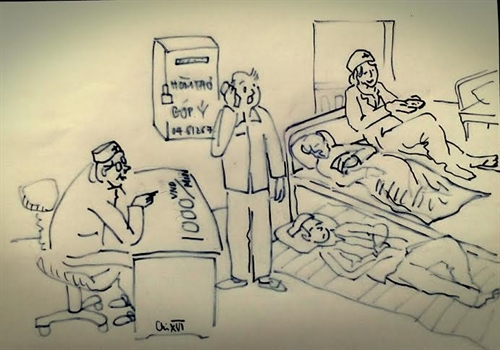 Talk Around Town
Talk Around Town

Various ministries and agencies have set up hotlines over the years to receive comments and recommendations from the public in order to improve the quality of their service. Hotlines help simplify some bureacratic procedures and signal the public that the ministries are heeding their complaints. But good intentions aside, running hotlines smoothly and effectively is a problem.
 |
By Thu Trang
Various ministries and agencies have set up hotlines over the years to receive comments and recommendations from the public in order to improve the quality of their service.
Hotlines help simplify some bureacratic procedures and signal the public that the ministries are heeding their complaints.
But good intentions aside, running hotlines smoothly and effectively is a problem.
Residents recently expressed their dissatisfaction at having to pay VNĐ1,000 (US$0.04) per minute when they call the Ministry of Health (MoH)’s hotline 19009095.
Residents lamented that the fee was high, but leaders of the MoH told the Tuổi Trẻ (Youth) newspaper that the fee was aimed at weeding out bogus callers or calls not related to the ministry’s jurisdiction.
Medical workers, they explained, could not concentrate on their work if they get too many crank calls on the hotline.
The fee is also needed to maintain the hotline operations and its infrastructure, said the MoH.
But the explaination did not ease public concerns.
Nguyễn Thu Giang, a mother of two living in Hà Nội, said it was unreasonable to charge callers to the hotline.
“The hotline is designed to help residents contact the ministry’s leaders quickly and to complain about their employees’ bad behaviour in order to help them better their services. So why do they take money from residents?” asked Giang.
If the ministry set up the hotline to better the image of doctors and nurses in the eyes of patients, and improve care, the hotline should be free of charge.
“Not only should it be free, the ministry should thank those calling the hotline because they spend time and effort and share confidences in order to help the ministry,” she said.
Agreeing with Giang, Nguyễn Văn Khoa of the Hải Phòng Bar Association said that in fact, poor people are the ones with the most complicated problems. They don’t have enough money to give medical workers a thank-you gift so they may face misbehaviour from some medical workers seeking bribes, he added.
“Several thousand đồng is a little money for rich people, but it will be such a great amount for poor residents who must save every thousand đồng for their meals and medicines,” said Khoa.
Many hospitals across the country are engaged in a “Say NO to envelopes of bribes” campaign, calling for doctors and nurses to reject payments from patients except for hospital fees. But by charging for the hotline, the ministry seems to be taking money from patients, he said.
An expert on information and technology told the Kinh Tế Đô Thị (Urban and Economics) newspaper that it was not costly to maintain a hotline, so ministries can use their budgets to pay for it rather than charging callers.
If the MoH collects fees from the public, it should announce clearly how the fees are used, he said.
Data presented last October by the MoH showed that in the first nine months of the year, more than 12,000 people called the MoH hotline.
Only 37 per cent of the calls were within the purview of the MoH.
Nonetheless, the MoH gave issued warnings to more than 2,000 medical staff over their reported behaviour toward patients, punished 63 and improved infrastructure at 188 hospitals and medical stations. The MoH also commended and rewarded 80 medical workers for their good service.
All in all, the hotline has proven to be an excellent supervising tool for the MoH. It is also a spy, present everywhere and at every time. The MoH and other ministries have a number of real inspectors, but how many misdeeds can they discover? With periodic inspections, medical stations, hospitals, doctors and nurses have time to prepare and inspectors cannot know what the medical workers will do when the inspection ends.
If the hotline becomes free of charge, more people will call and the quality of the country’s medical service will improve. – VNS




